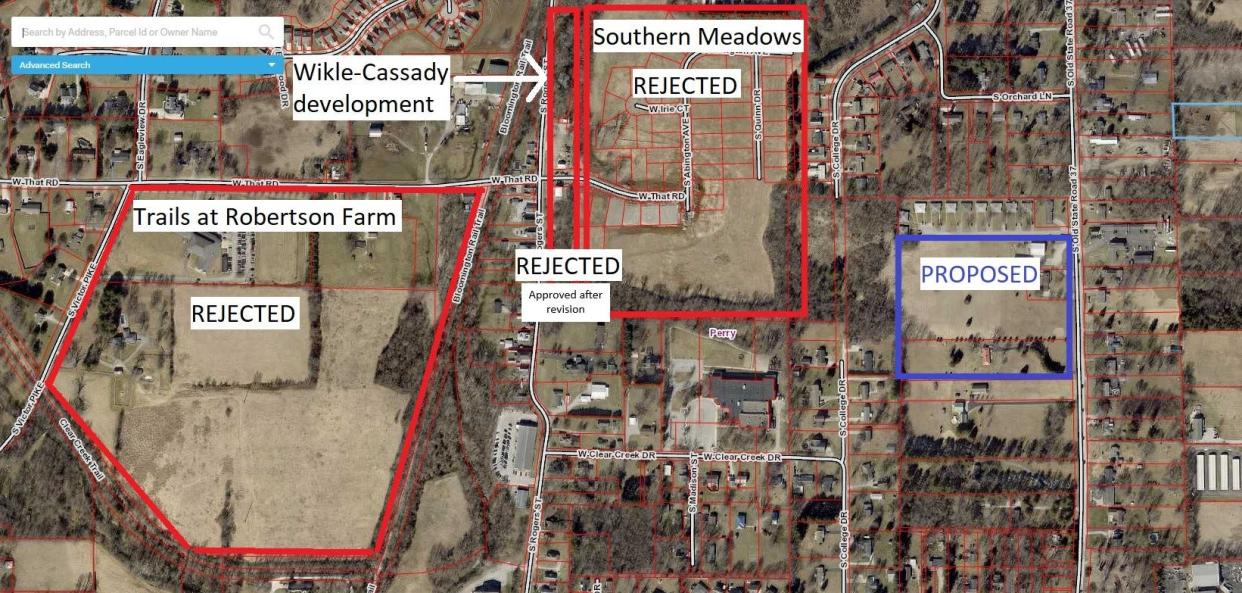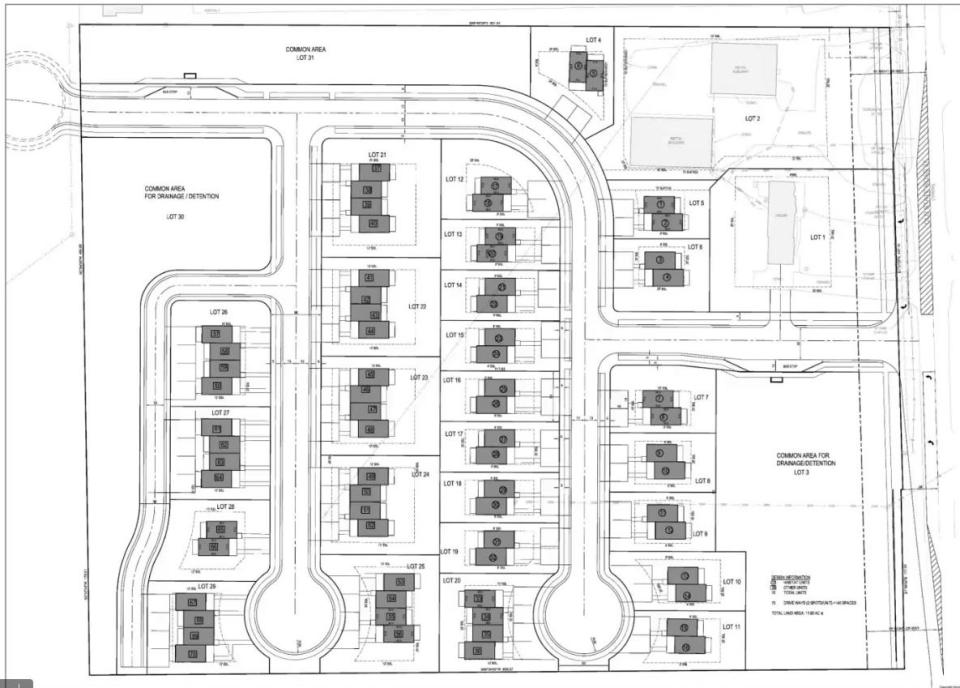'Hypocritical': Election opponents criticize Monroe County Commissioners' housing plan

Two local county commissioners up for re-election this year are receiving sharp criticism for their plans to use public dollars to support a 70-unit housing development near Clear Creek Elementary School, the same area where they previously rejected hundreds of homes proposed by private developers.
Peter Iversen, a county council member who hopes to unseat Commissioner Julie Thomas, said the commissioners have a record for voting for "housing stagnation."
Former Bloomington City Council member Steve Volan, who is running against Penny Githens in this year’s primary, said commissioners bear a large part of the blame for high local housing costs.
Jody Madeira, an IU law professor, also is running against Githens in the primary, said the commissioners’ proposal can be only the first step of many and said commissioners look hypocritical given their past decisions on housing developments in the Clear Creek area.
What the commissioners have proposed
Commissioners last week said they planned to use $3.5 million in pandemic relief dollars to pay for infrastructure on and near an 11-acre property at 4810 S. Old Ind. 37 to support the creation of 70 new housing units. Habitat for Humanity would build 32, mostly paired townhomes, while the property owner, Kenneth Blackwell, plans to build another 38 paired townhomes and quadplexes, with a per-unit price near $300,000.

County Attorney Jeff Cockerill said last week the county intends to spend some of the American Rescue Plan Act funds to rehab an existing building on the property to turn it into a child care center, which would be operated by a private or nonprofit provider.
The topic of housing, whether affordable single-family homes or the proliferation of student-focused apartments, has generated among the most divisive of conversations in the community in the last few years. The city council in 2020 considered allowing multi-family housing in almost all areas of the city to promote the construction of more units. However, a majority of the council rejected the plan after significant backlash from homeowners who worried that allowing developers to construct multiplex housing would affect property values and change the character of their neighborhoods.
County commissioners, too, have, in the last few years, given deference to current homeowners who have opposed new residential (and other) developments on the city’s fringes over concerns including traffic, flooding, density and changing the more rural character of the county’s unincorporated areas.
The discussion about housing density in the city and the county also have tainted relations between the city and county governments. The city council, including then council member Volan, in 2021 approved annexing about 8,200 acres and more than 14,000 residents on the city’s fringes. All three commissioners oppose annexation. The matter is tied up in court.
Commissioners: Project would address housing, child care shortage

At the commissioner meeting, Thomas expressed excitement about the proposed new development, and Githens said the project would help address the housing shortage as well as the child care shortage.
Cockerill said county officials liked the location in part because of its proximity to Clear Creek Elementary School and the Clear Creek Trail, both to the southwest, and the Kroger grocery store to the north. The Monroe County Public Library's Southwest branch also is nearby.
Commissioner Lee Jones said, “It’s just really nice to be able to provide this in an area that has so many amenities of this sort and hasn’t really received this kind of attention before now.”
Critics counter the area would have gotten attention had it not been for the commissioners’ opposition to proposed housing developments:
In May 2021, commissioners unanimously rejected a Clear Creek-area development proposed on South Rogers Road by Bloomington resident Tamby Wikle-Cassady. Commissioners rejected the proposal in part because of its density. They later approved a pared-down version with 24 residential units.
In June 2021, commissioners unanimously rejected developer Tom Wininger’s plan to construct 190 paired townhomes just east of Wikle-Cassady’s development and just west of where the county is now proposing a new neighborhood with paired townhomes and quadplexes. Wininger’s project, called Southern Meadows, had gotten support from the plan commission, the chamber of commerce and a Cook executive. At the time, Thomas said, “This is the county … not the city.” She also said she worried about sinkholes and that the homes would look too similar. Wininger had hoped to sell the townhomes for $250,000. He is now developing on the property single-family homes that start at $432,000.
In September 2021, commissioners unanimously rejected a rezoning request for the Trails at Robertson Farm, a proposed 125-unit residential development just southwest of Wikle-Cassady’s site. Commissioners said they were concerned about impact on flooding and traffic. They also said the price of the homes, which were to start at about $300,000, would not be affordable for people with an income of $100,000, though a local real estate agent disagreed. Thomas said last week the local plan commission may see a revised proposal for the Trails at Robertson development in March.
Opponents: Commissioners’ missteps contributed to high housing prices
Iversen said by rejecting those three proposals, the commissioners voted against homes for nearly 350 families.

As if this were not bad enough, he said, the commissioners and local planners now are proposing to reduce the share of the county’s acreage with a residential designation and increase the acreage with a rural designation.
Zoning updates: Is Monroe County planning to change how you can use your property? Here's how to find out
The county is updating its development ordinance, a set of local regulations that, broadly speaking, determine what can be built where. The planned reduction in residential acreage has gotten pushback from advocates for housing and economic development who have said they worry less residential acreage would make it more difficult to build homes.
Monroe County Planning Director Jackie Nester Jelen has said the zoning change from residential to rural would not eliminate a property owner’s ability to build a home — though it would require that lots be 2.5 acres, rather than the currently required 1 acre.
Iversen said he opposes the proposed changes.
“In an environment where we need more homes, the commissioners' record of stagnation and missed opportunities is hurting not just … families … but also the businesses that seek housing to support their workforce,” he said.
Iversen said as a county council member, he supports the use of ARPA dollars for the new residential development as a step in the right direction.
“But keep in mind,” he said, “that it took the County Council's involvement to push the commissioners even to this point.”
Volan said the commissioners are now willing to see paired townhomes “literally adjacent” to Wininger’s Southern Meadows development, where they rejected paired townhomes “because they wanted to ‘keep the county rural.’
“They're proposing market-rate quadplexes! They could have allowed similar density in the adjacent projects, and there’d be a hundred more $250K homes … being built right now.”
Volan said that at last week’s Monroe County Redevelopment Commission, “Cockerill literally said the commissioners told him, ‘Go find us a project. We wanna do an affordable housing project.’ Just one?
"Why aren’t they trying to make the whole county more affordable through zoning code?" Volan asked. "Why have they been just sitting on that ARPA money while interest rates and commodities went sky high?”
“Monroe County is not ‘rural’ any more,” Volan said. “The commissioners' lack of action is a primary reason for the high cost of housing.”
Madeira, who also is running against Githens, said she supports the use of ARPA money for the new neighborhood.
“These funds are intended for precisely these sorts of uses, including infrastructure investments for underserved locations,” she said via email.
Given the commissioners’ previous objections to developments in the area, their new proposal “is very suspect,” Madeira said. “On the other (hand,) it is difficult to oppose the development in a practical sense because the commissioners are finally moving ahead with development for residents."
She also said the project should be “just the first step of many that needs to be made towards providing affordable housing for county residents.
Madeira said while the commissioners “have treated local developers poorly in the past and now look hypocritical,” the current project, if approved, also “will make it more difficult for them to deny such proposals from private developers in the future.”
Commissioners defend decisions: New development is different
Thomas and Githens said last week that many aspects of their development proposal differ from the ones they have rejected.
Githens said via email neighbors’ opposition to the Trails development “weighed heavily in my decision. I was also concerned about the potential … for water damage to existing homes. … I don’t believe the proposed Habitat location poses the same threat.”
The commissioners’ proposal will still have to go through the local planning and plan commission process before required approval from the commissioners, which means neighbors will have to be notified and will be given the opportunity to weigh in about the project.
Asked whether she would withdraw her support of the new project if existing homeowners came out against it and, if so, how many would have to speak against it to change her mind, Githens said, “I cannot predict what nearby residents will say about the proposed new Habitat site. It’s not just the numbers, but a sense of how many of the nearby residents speak out.”
Githens also said she opposed Wininger’s townhome development because of the property’s karst features and additional traffic — from residents and delivery drivers — on Rogers.
Thomas said via email she approaches each project individually and said the county’s proposal would “help provide much-needed housing and day care services.” However, she said the plan commission and commissioners still have to look at the project’s details.
“Good planning reflects the consideration of these elements (among many) – the composition of the plan, the environment, and the impact on neighboring property owners. We will also consider the current zoning, infrastructure, the proposed zoning (Comprehensive Plan), etc.,” she said.
Boris Ladwig can be reached at bladwig@heraldt.com.
This article originally appeared on The Herald-Times: Election opponents critical of commissioners Clear Creek area housing

